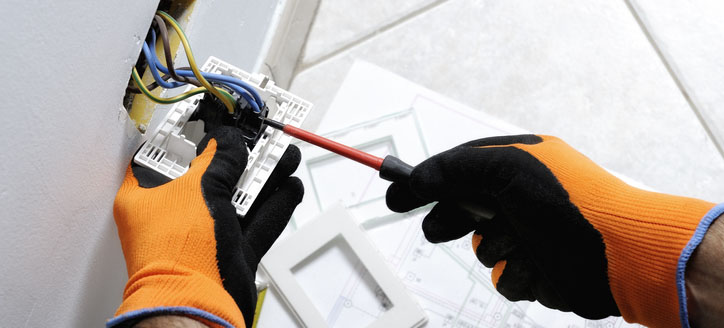Home » DPI – Dispositivi di protezione individuale » Guanti da lavoro » Guanti dielettrici
I guanti dielettrici sono guanti isolanti idonei per svolgere lavori elettrici in tensione a contatto, a distanza o potenziale.
Vengono spesso chiamati semplicemente guanti da elettricista perché è proprio questo il settore professionale che più li usa.
Ci riferiamo quindi ad addetti all’installazione, riparazione o manutenzione, anche di veicoli ibridi o elettrici. Oppure ad officine di ingegneria elettrica o anche aziende di fornitura elettrica.
In commercio e su Materiale Antinfortunistica sono disponibili moltissime varianti di guanti isolanti per lavori elettrici, ma anche elmetti dielettrici. Si distinguono per il grado di protezione che offrono ma anche per una serie di variabili, come spessore, misure e lunghezza.

Nei guanti dielettrici la normativa europea di riferimento è la EN 60903 che definisce i requisiti del DPI, le marcature che deve riportare e indicazioni sulla scadenza.
Ogni dispositivo deve rispettare anche una specifica classe: i guanti dielettrici sono infatti così suddivisi:
I guanti isolanti da elettricista possono poi avere altre caratteristiche aggiuntive ed essere così distinti in 5 categorie:
Per legge, i guanti isolanti riportano sempre una data di scadenza, oltre la quale non devono più essere utilizzati. Se però il guanto è rovinato, bucato o danneggiato va sempre sostituito prima perché non è più in grado di garantire la giusta protezione.
La normativa impone anche test periodici per verificarne la corretta efficacia, da eseguire su tutti i guanti per elettricisti, anche se mai utilizzati o in stoccaggio.
Il test va quindi eseguito:
Necessary cookies are absolutely essential for the website to function properly. These cookies ensure basic functionalities and security features of the website, anonymously.
| Cookie | Durata | Descrizione |
|---|---|---|
| cookielawinfo-checbox-analytics | 11 months | This cookie is set by GDPR Cookie Consent plugin. The cookie is used to store the user consent for the cookies in the category "Analytics". |
| cookielawinfo-checbox-functional | 11 months | The cookie is set by GDPR cookie consent to record the user consent for the cookies in the category "Functional". |
| cookielawinfo-checbox-others | 11 months | This cookie is set by GDPR Cookie Consent plugin. The cookie is used to store the user consent for the cookies in the category "Other. |
| cookielawinfo-checkbox-necessary | 11 months | This cookie is set by GDPR Cookie Consent plugin. The cookies is used to store the user consent for the cookies in the category "Necessary". |
| cookielawinfo-checkbox-performance | 11 months | This cookie is set by GDPR Cookie Consent plugin. The cookie is used to store the user consent for the cookies in the category "Performance". |
| viewed_cookie_policy | 11 months | The cookie is set by the GDPR Cookie Consent plugin and is used to store whether or not user has consented to the use of cookies. It does not store any personal data. |
Functional cookies help to perform certain functionalities like sharing the content of the website on social media platforms, collect feedbacks, and other third-party features.
Performance cookies are used to understand and analyze the key performance indexes of the website which helps in delivering a better user experience for the visitors.
Analytical cookies are used to understand how visitors interact with the website. These cookies help provide information on metrics the number of visitors, bounce rate, traffic source, etc.
Advertisement cookies are used to provide visitors with relevant ads and marketing campaigns. These cookies track visitors across websites and collect information to provide customized ads.
Other uncategorized cookies are those that are being analyzed and have not been classified into a category as yet.